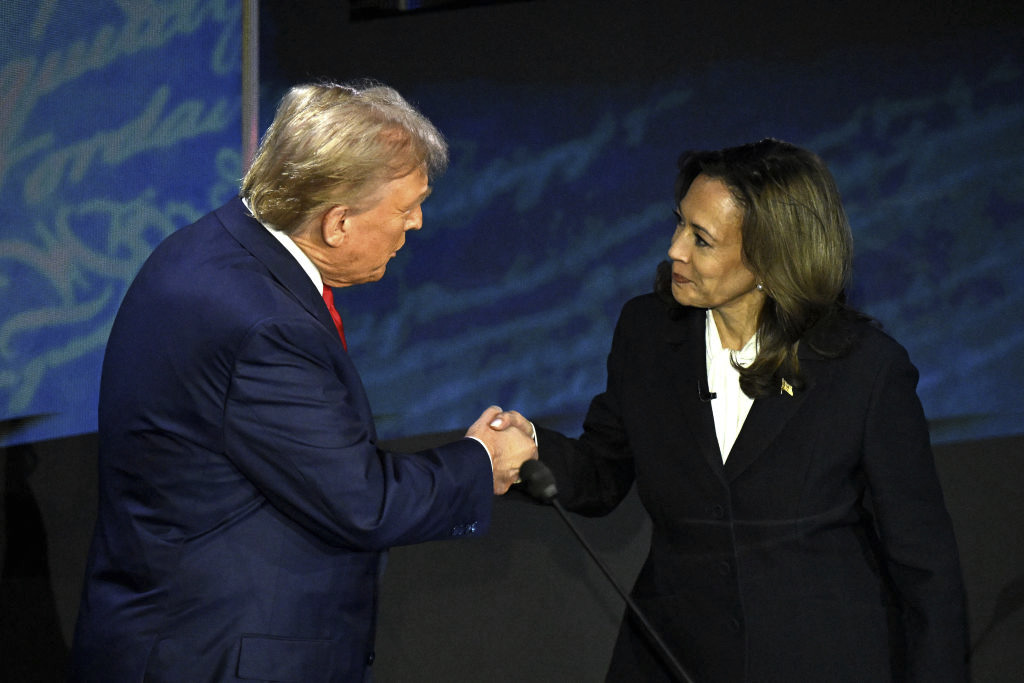 Pictured: US Vice President and Democratic presidential candidate Kamala Harris shakes hands with former US President and Republican presidential candidate Donald Trump during a presidential debate at the National Constitution Center in Philadelphia, Pennsylvania, on September 10, 2024. (Photo by Saul Loeb/AFP via Getty Images)
Pictured: US Vice President and Democratic presidential candidate Kamala Harris shakes hands with former US President and Republican presidential candidate Donald Trump during a presidential debate at the National Constitution Center in Philadelphia, Pennsylvania, on September 10, 2024. (Photo by Saul Loeb/AFP via Getty Images)
"This is not who we are!" This is one of the favorite shibboleths used by US Democrat Party's presidential nominee Kamala Harris and her supporters with the aim of portraying supporters of her Republican rival Donald Trump as not quite American, if not utterly alien.
One of Harris' "progressive" supporters expresses concern that she may win a huge majority of the popular vote in the November 5 election, but still fail to get the keys to the White House because of the Electoral College rule.
Another Harris admirer claims that she represents a vast majority of Americans, from Noam Chomsky to Dick Cheney, against a small Make America Great Again (MAGA) minority led by Trump. Whether or not that assertion is correct will soon be put to the test.
What interests us here is the division of Americas into "us" and "not-us," a shady game of alterity that reduces the competition of ideas in a modern democracy into a primitive expression of fear and loathing.
The "us" and "not-us" game has a long trail in American history.
The first settlers saw the distant British as "not-us" and maintained that view through several wars and decades of tense relations. Next, it was the turn of French and Spanish empires to be cast as "not-us," as the newly created United States built itself as the dominant power in the New World.
Decades of war against Native American tribes also took place in the context of us-versus-them in a clear racial context.
The Civil War between the slave-owning states of the south and the states of the north represented another division, though some Democrats in northern states, known as "Copperheads" supported the abolitionist Republican president Abraham Lincoln.
In the 1930s, the fear that the European version of the racist disease might spread to the US appeared serious with Father Charles Coughlin's radio propaganda and the long march by racists from Persepolis, a tiny half-imaginary town in middle America as reflected in Sinclair Lewis' dystopian novel It Can't Happen Here!
The witch-hunt led by Senator Joseph McCarthy in the 1950s furnished anther version of hostile alterity with an ideological undertone.
Harris is not alone in misunderstanding the nature of "otherness" in the American context. In the 2016 presidential campaign, the Democrat nominee Hillary Clinton dubbed Trump voters "deplorables" while pundits sympathetic to her camp noted that Trump voters were less educated, less traveled and poorer than those who chose Clinton.
Trump voters were also classified as TV-watchers rather than readers of newspapers, let alone books. The subtext was that if such lower species could decide the fate of the world's only superpower, then something must be wrong with electoral democracy.
By playing the "us" and "not-us" game, both Clinton and Harris forget that the US is founded on unity in diversity. On July 4, 1776, the newly created nation chose the Latin phrase E Pluribus unum ("From many, one") as its motto.
Sinclair Lewis's novel shows how the American man could be himself and his own opposite in the context of a system based on formal tolerance but genuine acceptance of even hostile otherness. At first glance, to foreigners such as this writer, the cliché "we're all Americans!" might sound trite. On closer examination, however, it is the wisest expression of a shared desire for coexistence in a system that thrives on diversity, competitive otherness, creative tension and enlightened trust in the rules of the game.
Thus, whether she likes or not, Harris, though the American-ness of her family is of recent nature, represents and owns the whole of the United States' history and identity. Rather than nursing old chagrins and grievances often inherited from generations long gone and using them as a prop for fake "otherness" she should defend her own vision of America's future while acknowledging the right of the "deplorable" to do the same.
Trying to blame Trump and his supporters for whatever was wrong in American history, for example slavery and violations of civil rights, allows the "not-us" of this game to blame the Democrats for mass illegal immigration, the decline of family values, and even electoral fraud.
The perception that America is going through a cultural civil war has derailed the debate in this curious election by preventing the raising and discussing of key economic, security and foreign policy issues.
Harris may yet ride her MAGA-bashing horse to victory. But even then, she wouldn't be able to provide effective leadership of a nation she has divided into "us" and "not-us."
There is still time, very little time, for Harris to realize that "This is not who we are" is a misleading and dangerous sentence. She, Trump and all others Americans are "who we are" together. They are heirs to the great achievements and the regrettable injustices of their nation's history, and jointly responsible for shaping the future.
Amir Taheri was the executive editor-in-chief of the daily Kayhan in Iran from 1972 to 1979. He has worked at or written for innumerable publications, published eleven books, and has been a columnist for Asharq Al-Awsat since 1987. He is the Chairman of Gatestone Europe.
This article originally appeared in Asharq Al-Awsat and is reprinted with some changes by kind permission of the author.

 By Gatestone Institute | Created at 2024-10-20 08:08:07 | Updated at 2024-10-20 12:35:39
4 hours ago
By Gatestone Institute | Created at 2024-10-20 08:08:07 | Updated at 2024-10-20 12:35:39
4 hours ago



